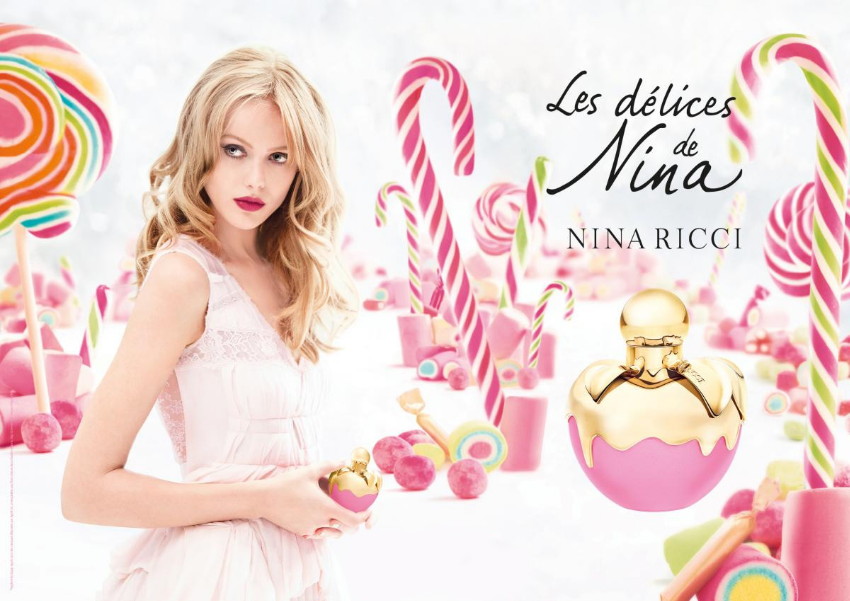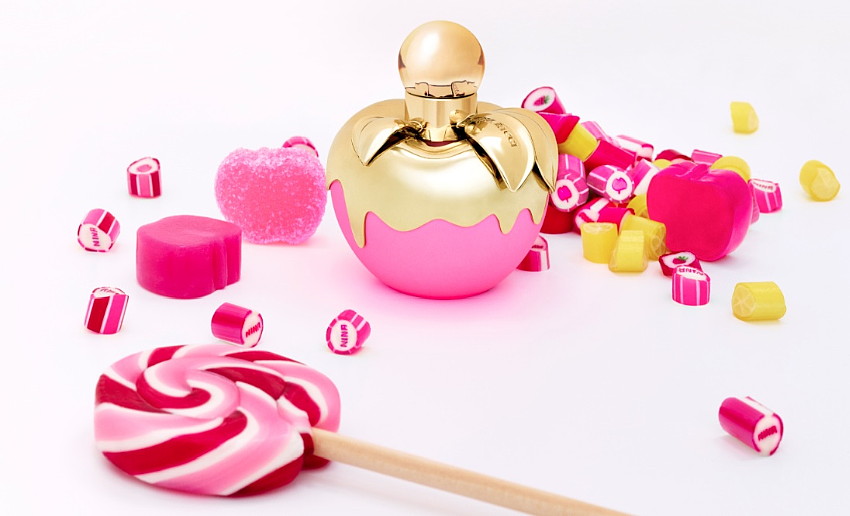Nina Ricci Les Délices de Nina (2015): Sugar is the Opium of the People {Perfume Review & Musings}

The first accords of Les Délices de Nina replace the perfume in the context of the original (2006) while inviting you to step into an eminently satisfying buttery sensation. It is about conveying the sense that the perfume is edible while it is not. Perfumers Olivier Cresp and Marie Salamagne of Firmenich are playing with the frontiers of food and perfume in an ongoing quest for a moving frontier since the birth of Angel by Thierry Mugler, which Cresp fathered...
The promised strawberry and white caramel notes, which are the new nuances here, are present yet not as obvious as in a, say for the first one, a strawberry body butter by The Body Shop which is much more about a monumentally obvious strawberry. Here, the fruity weaving is subtler.
The white caramel note smells like the "White Rabbit creamy candy" brand, which is an iconic brand and taste in China. Where the mind wanders and appreciates the composition is in how the nuanced olfactory layering of caramel takes place going from buttery to bland caramel, then to salty caramel and finally to a lactonic spill of milk. The strawberry colors that main work around milky caramel - the main accord - which slowly turns more floral as if you were coming out of a tunnel made of candies. At the end of the tunnel, there is a breath of fresh air with a minute nuance of muguet, but mainly of gardenia.
The perfumers have naturally thought of the skeleton role that the floral accord of gardenia can play with its lemony top note, floral heart and its creamy base note. It is like making certain the strawberry chewy candy is not felt to be just a pile of candies but an idea structured by elegance. The fact that you can catch wafts of the scent, which are reminiscent of Vol de Nuit by Guerlain informs you that the classic floriental plays a role in that foody adaptation.

The fragrance is said to be inspired by the fairy tale of Hansel and Gretel by the Brothers Grimm. This source of inspiration is best felt in the sensation of entering into a foody realm of sensation and then coming out of it. The fragrance smells a bit of gingerbread too, thanks to the orange note.
All in all, this is a pretty, gourmand floriental which rests on understated technical maestria at the service of a success, Nina new generation, and of a cultural predilection for gourmand fragrances.
With professional perfume-making as opposed to artistic perfume-making, talents are used to widen our sense of comfort and offer a variety of experiences within a given range; it is certainly not about shifting perspectives. In fact, if anything, it is about reinforcing our habits.
Smelling Les Délices de Nina is staying in our comfort zone - the composition is harmonious and well done - with the added offered depth of inviting us to burrow our noses into some pretty primal scents like that of butter. So, in an age when many decry fat and butter, which has the sign "use with caution" flashing next to it in our fridges, who knows if there is not here a modicum of psychological transgression, that indispensable ingredient to perfumery? It certainly feels at times like laddles of melted hot butter could be associated with Thanatos in contemporary mores.
In Hansel and Gretel there is a sense of danger linked with famine; fast forward to the era of food security in industrial societies and another problem arises of potential premature death by clubbings of sugar and saturated fat, i.e., cheap food mostly, but much better than famine. Les Délices de Nina is actually playing with our ambivalent attitudes towards plenty and perhaps more critically, with our sense that it is not so much about experiencing too much of a good thing but too much of a bad thing, which is a displaced problem in today's consumerist society. It overdoses on, admittedly, two common opiates for the people, fat and sugar, while keeping it stylish. Delights now, Opium then - we are looking at a sugary opium and this idea was influenced by our previous review of Smoky Poppy - and do we need to add, a very loose take on Karl Marx.









